CBIC hosted 4th National Conference on functioning of Land Customs Stations (LCSs) in New Delhi
CBIC hosted 4th National Conference on functioning of Land Customs Stations (LCSs) in New Delhi
The Central Board of Indirect Taxes and Customs (CBIC) hosted the 4th National Conference on the Functioning of Land Customs Stations (LCSs), on 28th and 29th August 2024 in New Delhi. The two-day Conference was inaugurated by Revenue Secretary, Shri Sanjay Malhotra and chaired by Chairman (CBIC), Shri Sanjay Kumar Agarwal. Member (Customs), Shri Surjit Bhujabal, Member (IT & Tax Payer Services), Smt. Aruna Narayan Gupta, Member (Compliance Management), Shri Rajiv Talwar, and Chairman, Land Port Authority of India, Shri Aditya Mishra, were also present, among others.
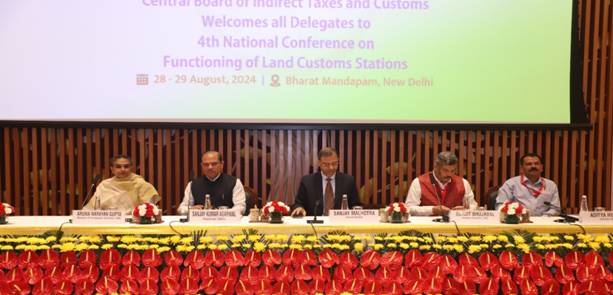
The two-day Conference provided a platform for key stakeholders to discuss the current challenges and future strategies for enhancing the operations of India’s Land Customs Stations and Integrated Check Posts along with movement of passengers with India’s neighbouring countries.
The conference brought together more than 100 experts and key stakeholders to discuss and present specific recommendations on:
Revenue Secretary, Shri Sanjay Malhotra, in presence of CBIC Chairman Shri Sanjay Kumar Agarwal; Special Secretary & Member (Customs) Shri Surjit Bhujabal; and Special Secretary & Member (IT & TPS) Smt. Aruna Narayan Gupta, launched a booklet titled ‘Bridging Borders & Connecting Nations: India’s Land Customs Stations’ at the Conference in New Delhi.
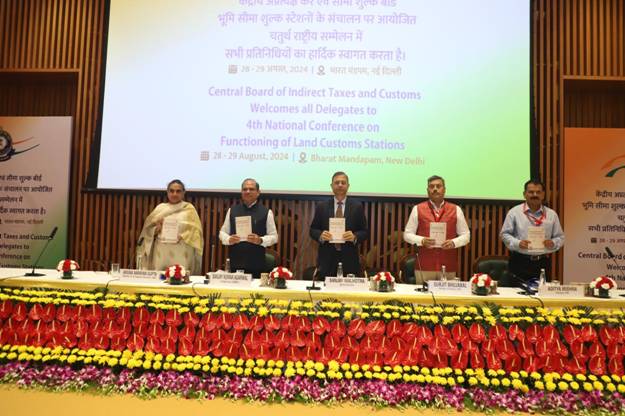
This booklet provides an in-depth look at India’s Land Customs Stations, showcasing the country’s efforts to facilitate trade, enhance regional connectivity, and strengthen ties with neighbouring countries.
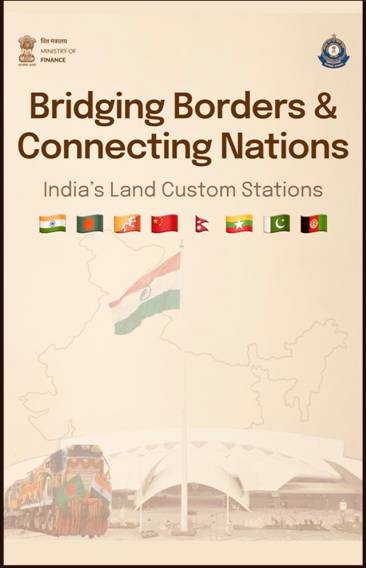
The first day of the Conference was focused on inter-ministerial discussions. In addition to officers from CBIC formations, representatives from Ministry of External Affairs, Ministry of Home Affairs, Land Ports Authority of India, Ministry of Commerce & Industry, Inland Waterways Authority of India, Ministry of Railway, Ministry of Textiles, Ministry of Road Transport and Highways, Ministry of Agriculture and Farmers Welfare, Ministry of Fisheries, Animal Husbandry & Dairying, Food Safety & Standards Authority of India, Ministry of Development of North Eastern Region and several state governments also actively participated.
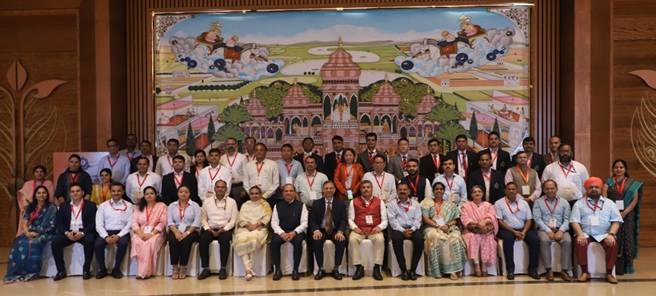
The event also saw the participation of international organisations, trade bodies and think tanks such as the Asian Development Bank, World Bank, Indian Council for Research on International Economic Relations, United Nations Economic and Social Commission for Asia and the Pacific and the Federation of Indian Chambers of Commerce & Industry.
The discussions centered around optimising the operational efficiency of Land Customs Stations and enhancing trade facilitation at international borders with the neighbouring countries with a special focus on Bhutan, Bangladesh and Nepal. The inter-ministerial dialogue emphasized the importance of coordinated efforts among different ministries and organisations to ensure a seamless trade environment. International Organisations, Think Tanks and Trade Associations updated on infrastructure and knowledge projects undertaken in South Asia Region.
On the second day, discussions covered Infrastructure development and logistics issues, Manpower and Human Resources issues, Anti-smuggling and risk management, Digitization and Process Improvement, as well as Gender mainstreaming at Land Customs Stations. A key theme was the need for stronger inter-departmental coordination and the adoption of advanced technologies. Participants also highlighted the importance of improving infrastructure and streamlining procedures to facilitate smoother and more efficient trade flows through India’s land borders.
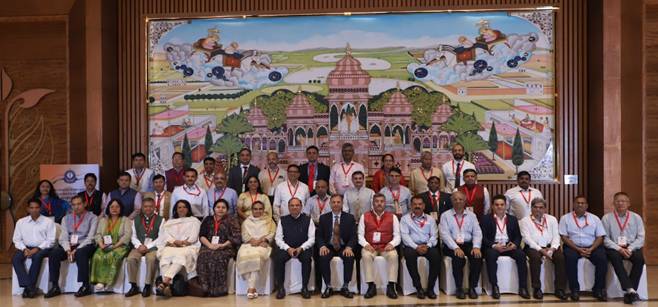
CBIC successfully concluded the Conference on a positive note with significant takeaways for relevant stakeholders and setting a clear path with a message that ‘Collaboration is the key for Trade Facilitation at the Indian Borders which are the First Villages of India’. The outcomes of the Conference are expected to significantly contribute to CBIC’s ongoing efforts to enhance the efficiency and effectiveness of LCSs, ensuring that India’s trade facilitation mechanisms meet global standards.
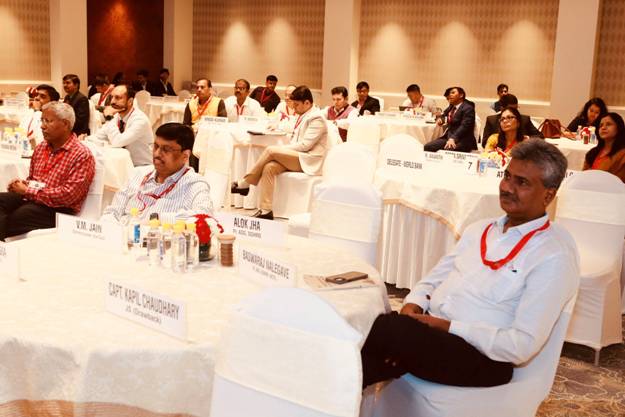
CBIC remains committed to its mission of optimising the functioning of Land Customs Stations and facilitating seamless cross-border trade, which is vital for India’s economic growth and international trade relations. These efforts align with the Government of India’s larger objectives under initiatives like ‘Vikshit Bharat’ and ‘Atmanirbhar Bharat,‘ aiming to boost regional trade, strengthen cross-border relations, and enhance economic integration with neighboring countries.
Land Customs Stations in India
There are 122 Land Customs Stations (LCSs) notified under Customs Act, 1962, which are strategically located along India’s borders for trade with 7 neighbouring countries i.e. Afghanistan, Bangladesh, Bhutan, China, Myanmar, Nepal and Pakistan, spread across 16 states of India. These LCSs facilitate the smooth movement of goods and people across international borders. Integrated Check Posts (ICPs) have been established at 12 key locations – Attari Road, Agartala, Petrapole, Jogbani, Raxaul, Moreh, Dera Baba Nank, Suterkandi, Srimantapur, Dawki, Rupaidhia and Sabroom, offering modern infrastructure and streamlined processes for efficient customs clearance. Additionally, 7 Border Haats have been set up at specific locations along the India-Bangladesh border to promote local trade by allowing local vendors to sell goods in designated areas, contributing to the economic upliftment of border communities.
CBIC has actively engaged in bilateral and multilateral dialogues with partner countries to harmonize customs procedures, and creating a conducive environment for trade facilitation. Systemic reforms like National Single Window System (SWIFT), advanced risk management system, Post Clearance Audit, Authorized Economic Operator (AEO) programme, movement of cargo under Electronic Cargo Tracking System (ECTS), decongestion of land borders through promoting off-border clearances, among others have promoted ease of doing business at the Land Customs Stations. As per the National Time Release Study (NTRS) 2024 published by CBIC, there has been a significant 50 percent reduction in average release time in case of Integrated Check Posts in 2024 compared to the corresponding period in 2023. CBIC has taken several initiatives to promote trade and transit with the neighboring countries in recent times, such as:
- CBIC in the last month has allowed transhipment of Bangladesh export cargo to third countries through Air Cargo Complex, Kempegowda International Airport, Bengaluru. This is in addition to the earlier notified air cargo complexes for this purpose viz. Delhi and Kolkata.
- Land Customs Station, Maia in Murshidabad District, West Bengal with river route connecting Maia in India to Bangladesh has also been notified. The new waterway route from Maia to Dhubri in Assam through Bangladesh will reduce the distance by around 930 kilometers compared to the previous waterway route through Kolkata upto Dhubri.
- Last year, Nischintpur Railway Station in Tripura was notified as an LCS under the Customs Act. This is a part of Agartala-Akhaura railway project, which is the first railway project between the North Eastern Region and Bangladesh and is expected to boost tourism, trade and people-to-people exchanges.
- CBIC has notified an additional route of LCS Sabroom in Tripura in May 2023. This 1.9 km long Maitri Setu road is poised to herald a new chapter for trade and people to people movement and with this, Tripura may become the ‘Gateway of North East’ with access to Chittagong Port of Bangladesh, which is just 80 Kms from Sabroom.
- In May 2023, CBIC operationalized Indian Customs Yard at Jogbani and notified a rail route linking Jogbani to Biratnagar in Nepal. The movement of freight via rail increases the efficiency and cost-competitiveness of the operations apart from diversifying the modes of trade through the Land Customs Stations between the two countries. The transit of goods from the Indian Gateway Ports of Kolkata, Haldia and Vishakhapatnam through this route to Nepal via rail would be under Electronic Cargo Tracking System which reduces the processing time and increases cargo security.
- Recently, an Inter-Ministerial experts’ delegation, led by CBIC, visited Bhutan and held capacity-building workshops in four different cities for the benefit for SME exporters of Bhutan operating in agriculture sector. Govt of Bhutan has wholeheartedly appreciated this initiative of India.
- For providing connectivity to landlocked developing country Bhutan, CBIC in February, this year has issued a Standard Operating Procedure allowing transit of goods between Bhutan and Bangladesh using riverine route through India with the entry/exit points at Jogighopa and Pandu ports in Assam.
- CBIC is also conducting trainings in NACIN under SASEC Memorandum of Intent signed in 2017 on Customs Capacity Building. Several capacity building programs for the delegates of SASEC countries have been conducted till date under the said MOI by NACIN. The latest SASEC capacity-building programme was conducted by NACIN on Trade Facilitation for Cross Border E-commerce in December, 2023.